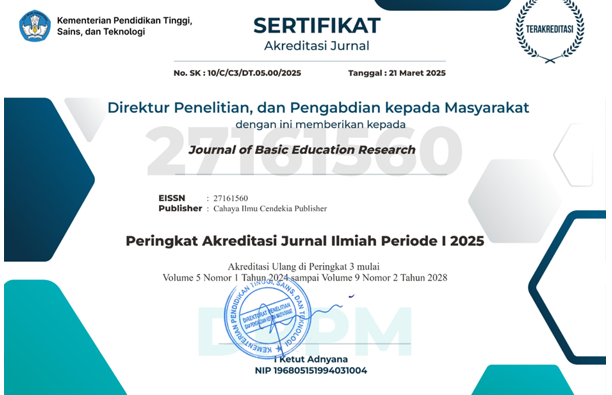Improving Learning Outcomes Using Jigsaw Learning in High Class Elementary Schools
Abstract
Purpose of the study: This research addresses the challenge of low student learning outcomes and limited group learning engagement. Specifically, it seeks to enhance students' thematic learning outcomes by implementing the Jigsaw learning model.
Methodology: The study employs a classroom action research design conducted over three cycles. The subjects of this research were 34 students from class VI.B at Elementary School 25 Palembang. Data collection techniques included observation, tests, and documentation to gather comprehensive student performance and engagement insights.
Main Findings: The research findings indicate a significant improvement in student learning outcomes due to applying the Jigsaw learning model. The thematic learning outcomes for theme 1, subtheme 2, showed a marked increase across the three cycles: from 53% in cycle I to 65% in cycle II and 88% in cycle III. This progression highlights the model's effectiveness in fostering better academic performance and active participation among students.
Novelty/Originality of this study: The novelty of this research lies in its application of the Jigsaw learning model within the context of thematic learning, which is relatively underexplored in primary education. The study enhances cognitive outcomes and promotes social skills and collaborative learning by integrating cooperative learning strategies that emphasize student interdependence and accountability. This innovative approach demonstrates the potential of the Jigsaw model to transform traditional classroom dynamics, making learning more interactive, inclusive, and effective. Thus, the study provides valuable insights and practical implications for educators seeking to improve student engagement and achievement through collaborative learning models.
References
Depdiknas. (2003). Undang-undang RI No.20 tahun 2003 tentang Sistem Pendidikan Nasional [Republic of Indonesia Law No.20 of 2003 concerning the National Education System].
N. Nurkholis, “Pendidikan dalam upaya memajukan teknologi [Education in an effort to advance technology]”. Jurnal Kependidikan, vol. 1, no. 1, pp. 26, 2012.
S. N. Amalia, Amrah, & Hotimah, “Penerapan model pembelajaran kooperatif tipe jigsaw untuk meningkatkan hasil belajar pkn peserta didik kelas v sd [Application of the jigsaw type cooperative learning model to improve the civics learning outcomes of fifth grade elementary school students],” Nubin Smart Journal, vol. 3, no.1, pp. 12-21, 2023.
H. Setiadi, “Pelaksanaan penilaian pada kurikulum 2013 [Implementation of assessment in the 2013 curriculum],” Jurnal Penilaian Dan Evaluasi Pendidikan vol. 20, no. 2, pp. 166-178, 2016.
L. Dewi & E. Fauziati, “Pembelajaran tematik di sekoah dasar dalam pandangan teori konstruktivisme Vygotsky [Thematic learning in elementary schools in the view of Vygotsky's constructivism theory],” Jurnal Papeda, vol. 3, no. 2, 2021
I. S. Wati & Arwin, “Peningkatan proses pembelajaran tematik terpadu menggunakan model discovery learning di kelas iv sd [Improving the integrated thematic learning process using the discovery learning model in class iv elementary school],” Jurnal inovasi pembelajaran SD, vol.8, no.4, 2020.
S. Rahmawati and W. P. Lestari, “penerapan model pembelajaran jigsaw dalam meningkatkan hasil belajar tematik pada peserta didik kelas v sd nurul islam Surabaya [Application of the jigsaw learning model in improving thematic learning outcomes for class V students at Nurul Islam Elementary School, Surabaya],” Conference of Elementary Studies, 2020.
A. Asnawi, R. Fransyaigu, and B. Mulyahati, “Konsep pembelajaran terpadu dalam kurikulum 2013 di sekolah dasar [Integrated learning concept in the 2013 curriculum in elementary schools],” Jurnal Seuneubok Lada, vol. 3, no. 2 , 2016.
K. E, N. Nahak, N.S.Degeng, U.Widiati, “Pembelajaran tematik di sekolah dasar [Thematic learning in elementary schools],” Jurnal Pendidikan, vol. 4, no. 6, pp. 785-794, 2019.
K. I. Soetikno, M. E. Rindengan, and D. Tombokan. “Penerapan model pembelajaran jigsaw untuk meningkatkan hasil belajar tema berbagai pekerjaan di kelas iv sd inpres Kakaskasen III [application of the jigsaw learning model to improve learning outcomes on the themes of various jobs in class 4 elementary school inpres kakaskasen iii]”. Jurnal pendidikan dasar, vol. 4, no. 2, 2023.
F. Fitriani, “Pengaruh motivasi belajar dan disiplin terhadap hasil belajar ips siswa di smp karya indah kecamatan tapung [The influence of learning motivation and discipline on students' social studies learning outcomes at Karya Indah Middle School, Tapung District,” Jurnal PeKA, vol. 4 no, 2, 2016.
S. Sulastri, “Meningkatkan hasil belajar peserta didik melalui strategi pembelajaran berbasis masalah pada pembelajaran ips di kelas v sdn 2 limbo makmur kecamatan bumi raya [Improving student learning outcomes through problem-based learning strategies in social studies learning in class V SDN 2 Limbo Makmur Bumi Raya District],” Jurnal Kreatif Tadulako Online, vol. 3 no. 1, pp. 92, 2015.
R. Syaputri & R. Eliyasni, “Pengaruh model kooperatif tipe jigsaw terhadap hasil belajar tematik terpadu kelas iv sekolah dasar [The influence of the jigsaw type cooperative model on integrated thematic learning outcomes in grade IV elementary school],” Jurnal Pendidikan Tambusai, vol. 4, no. 3, 2020.
B. Syahri, M. Giatman, M. Muskhir, H. Effendi, and A. Hilman, “Model pembelajaran tipe jigsaw berbasis problem based learning untuk meningkatkan aktivitas dan hasil belajar [The jigsaw type learning model is based on problem based learning to improve activities and learning outcomes],” Journal of Education Action Research, vol. 7, no. 1, pp. 58-67, 2023.
A. K. Jeppu, K. A. Kumar, and A. Sethi, “‘We work together as a group’: implications of jigsaw cooperative learning,” BMC Medical Education, vol. 23, no. 1, pp. 734, 2023.
I. Irwan and H. Hasnawi, “Analisis Model Pembelajaran Contekstual and Teaching and Learning Dalam Meningkatkan Hasil Belajar PPKN di Sekolah Dasar”, Jurnal Ilmiah Pendidikan, vol. 3, no. 1, pp. 235-245, 2021.
I. P. T.Darmita, “Implementasi model pembelajaran kooperatif tipe jigsaw untuk meningkatkan prestasi belajar bahasa indonesia peserta didik kelas v semester i sd negeri 3 sawan [Implementation of the jigsaw type cooperative learning model to improve the Indonesian language learning achievement of class V semester I students at SD Negeri 3 Sawan]”. Indonesian Journal of Educational Development, vol. 3, no. 1, pp. 95-103, 2022.
R. M. Abobaker, M. S. Alamri, B. Alshaery, and A. Hamdan-Mansour, “Impact of Jigsaw Cooperative Learning Strat-egy on academic achievement and opinion among Nursing Students,” J Holist Nurs Midwifery, vol. 33, no. 1, pp. 43-51, 2023.
N. M. Hanapi, and M. M. M. Kamal, “Jigsaw classroom: A process of cooperative learning and discussion,” Semarak International Journal of Innovation in Learning and Education, vol. 1, no. 1, pp. 24-31, 2024.
O. C. Drouet, V. Lentillon-Kaestner, and N. Margas, “Effects of the Jigsaw method on student educational outcomes: systematic review and meta-analyses,” Frontiers in Psychology, vol. 14, pp. 1216437, 2023.
A. T. Kurniawan, S. Sudirin, and S. Firnanda, “The application of the jigsaw type cooperative learning model to improve social science learning outcomes,” Bulletin of Pedagogical Research, vol. 4, no. 1, pp. 34-44, 2024.
F. Zaenal, D. Darsan, and E. Intyas, “The effect of the implementation of the jigsaw model on students'motivation and learning outcomes in the subject of entrepreneurship at hidayatul mubtadiin vocational school,” Journal of Education Technology and Inovation, vol. 6, no. 1, pp. 1-9, 2023.
Rusman, Pembelajaran tematik terpadu. Jakarta: PT Raja Grafindo Persada, 2012.
L. Farida, and S. Suyanto, “Improving student learning outcomes using the jigsaw type cooperative learning model in science lessons on the respiratory system material humanity in class v sdkr. Mutiara kasih students,” Review Of Multidisciplinary Education, Culture And Pedagogy, vol. 3, no. 1, pp. 55-66, 2023.
D. S. Susik “Upaya meningkatkan hasil belajar pada pembelajaran tematik tema “Makanan Sehat” Melalui penggunaan model pembelajaran kooperatif tipe jigsaw pada peserta didik kelas IV SD Citra Bakti [Efforts to improve learning outcomes in thematic learning with the theme "Healthy Food" through the use of a jigsaw type cooperative learning model for fourth grade students at Citra Bakti Elementary School],” Jurnal Citra pendidikan, vol. 8, no. 2, pp. 985, 2023.
S. Suhartika “Meningkatkan kemampuan membaca intensif dengan penerapan belajar berkelompok pada peserta didik kelas II SDN Bedus tahun pelajaran 2017/2018 [Improving intensive reading skills by implementing group learning for class II students at SDN Bedus in the 2017/2018 school year]”, Jurnal Ilmiah Mandala Education, vol. 4 no. 2, 2018.
U. Habibah, “Meningkatkan aktivitas dan hasil belaajr matematika peserta didik madrasaha ibtidaiyah melalui model PAIKEM [Increasing the activities and mathematics learning outcomes of madrasah ibtidaiyah students through the PAIKEM model]”. Journal Of Elementary Education, vol. 2, no. 2, 2013.
H. Pontoh, “Penerapan model pembelajaran jigsaw untuk meningkatkana hasil belajar ilmu pengetahuan sosial (ips) peserta didik kelas v sd inpres salabenda kecamatan Bunta [Application of the jigsaw learning model to improve social science (IPS) learning outcomes for class V elementary school students in Presidential Instruction, Salabenda, Bunta sub-district],” Jurnal kreatif tadulako online vol. 4, no. 11, pp. 204, 2018.
Suismanto, “Peningkatan hasil belajar peserta didik melalui model pembelajaran kooperatif jigsaw pada pembelajaran matriks [Increasing student learning outcomes through the jigsaw cooperative learning model in matrix learning],” Jurnal Karya Ilmiah Guru, vol. 8, no. 1, pp..36, 2023.
K.I Soetikno, “Penerapan model pembelajaran jigsaw untuk meningkatkan hasil belajar tema berbagai pekerjaan di kelas iv sd inpres kakaskaen iii [Application of the jigsaw learning model to improve learning outcomes on the themes of various jobs in class IV to Inpres Kakaskaen III],” Jurnal Pendidikan Dasar, vol. 4, no. 2, 2023.
A.S. Alfazr, D. Gusrayani, & D.T Sunarya, “Penerapan model pembelajaran jigsaw untuk meningkatkan hasil belajar siswa dalam menemukan kalimat utama pada tiap paragraph [Application of the jigsaw learning model to improve student learning outcomes in finding the main sentence in each paragraph],” Jurnal Pena Ilmiah, vol. 1, no. 1, 2016.
Copyright (c) 2024 Alya Karina, Anita Putri Oktariani, Dong Anh Chi Hong

This work is licensed under a Creative Commons Attribution 4.0 International License.
Authors who publish with this journal agree to the following terms:
- Authors retain copyright and acknowledge that the Journal of Basic Education Research is the first publisher licensed under a Creative Commons Attribution 4.0 International License.
- Authors are able to enter into separate, additional contractual arrangements for the non-exclusive distribution of the journal's published version of the work (e.g., post it to an institutional repository or publish it in a book), with an acknowledgment of its initial publication in this journal.
- Authors are permitted and encouraged to post their work online (e.g., in institutional repositories or on their website) prior to and during the submission process, as it can lead to productive exchanges and earlier and greater citation of published work.





.png)


.png)
.png)


















